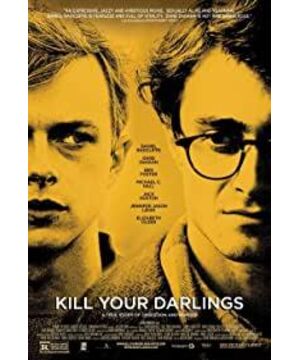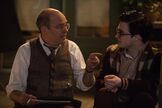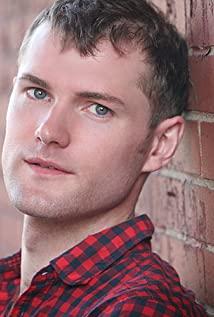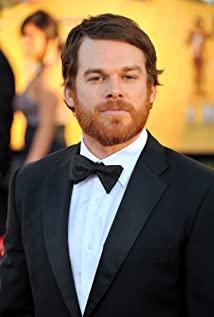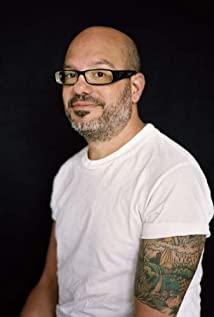From the point of view of the emotional line alone, a black rose blooms in the center of the accumulated desire, and anyone who is a little crooked wants to touch it. They create and live with Lu as the center. People who write poems are serious, and people who read poems are the most ruthless. Lu in the movie seems to be a ruthless kind of reading poems. Those who write poems for Lu are surging with surging desire and infatuation under the cover of creation. The more persistent a person is, the more morbid it is. David's death is predictable. If he doesn't get it, he will die at his hands. It seems to be fulfillment in another sense. Although Lu wrote the perfect day on the photo, I personally think that Lu's affection for David is like a father, a brother and a close friend, not a lover. It is he and Allen that are involved. After all, Lu responded to Allen's kiss. . If Lu hadn't killed David, maybe something would have happened to him and Allen, instead of finally being released from prison in self-defense for homosexual assault, from this point of view, there was no chance for Lu to bend. Moreover, Lu's attitude towards feelings and responses to them are also ambiguous. He enjoys admiration and indulgent pursuit, but he is detached and only pursues what he wants. Allen is just a touch of emotion. But in the Beat Generation, sexual disorder and sexual orientation can be discussed separately.
Therefore, Lu is to Allen what opium is to patients. Lu opened the door to a new world for Allen to create a new horizon. There must be enough rebelliousness to resist enough boring life. Literature without characteristics is dry. Artists without sex and alcohol are rigid, and when Allen comes into contact with these through Lu, his poetry is dynamic and extraordinary, such as a poem he read to Lu on a slightly swaying boat:
Be wary that you are not there Wonderland
I heard that strange madness has grown in your soul for a long time
, but you are lucky because you have arrogance, you isolate the
pain, and you can find the hidden love. Give
, share, lose
. At least it won't die before it blooms.
Allen felt a strange madness in Lu, which was the root cause of his obsession with Lu.
It's a pity that those who write poems are serious, those who read poems are the most ruthless, and Lu is the most crooked straight man.
In addition, the beat generation is the least bound by emotions, otherwise Jack would not have written a famous novel such as "On the Road" after escaping from marriage, they are as free as the wind.
In addition to the growth of Allen, the clues of the film are the end of the war. The United States is not the main battlefield, but the impact of the war on literature is huge. Young writers ponder in the war, have a unified goal, and have a negative impact on peace. Expectation trumps everything. When they get what they want most, they become at a loss. What goal can be compared to the grandeur and breadth of peace? They become decadent, looking for stimulating spiritual experience in the boring life, so the age of drugs, alcohol, and jazz came, and the indulgence of the beat generation was the emptiness of an era, but it was definitely not a useless emptiness. This kind of emptiness is injected into literature, and the emptiness is described in negative and sluggish words, so as to get rid of the era of emptiness and usher in the golden age of literature.
I have always felt that no matter how desperate the words are, there is an endless stream of hope hidden. Like the frail young men who finally conquer the hungry wolf in Jack London's "Love of Life", sooner or later they will rise up and go to the wider society. The Beat Generation eventually grew up, took on family responsibilities and social responsibilities, and became the most solid pillar of society. Forgive the rebellious young people, believe in the resilience of young people, and wait for the growth of young people.
Some parts of the movie are a bit rough, but the overall film is not bad after only 14 days, Daniel's acting is good, at least I won't jump to Harry Potter when I watch the movie, the role of Lu, the blond boy, smoky , the beauty of falling, Dane fits very well. RDJ once said that he doesn't like low-budget independent films, because of the short polishing time, the fame of actors, and many drawbacks. In fact, this is not unreasonable. Like killing Ru Ai, if it wasn't for Dai Hanhan and Dan Niu, there would not be so many. People go see it. However, small-budget independent films also have advantages. They polish their acting skills. Dai Hanhan has acted in quite a few low-budget films, and his acting skills are considered to be the best among actors of his age (although I think in Life, both he and Pattinson are somewhat lacking in their acting skills), Little Green The devil is really eye-catching, he is too suitable for the setting of morbid and weak teenagers with psychological problems.
Finally, I sigh about the unruly and crazy souls of the literary giants when they were young, and there is only a thin line between genius and lunatic.
Another lover runs to the sky The
circle is broken
but death also brings rebirth
Like all lovers and sad people
I'm a poet
View more about Kill Your Darlings reviews


